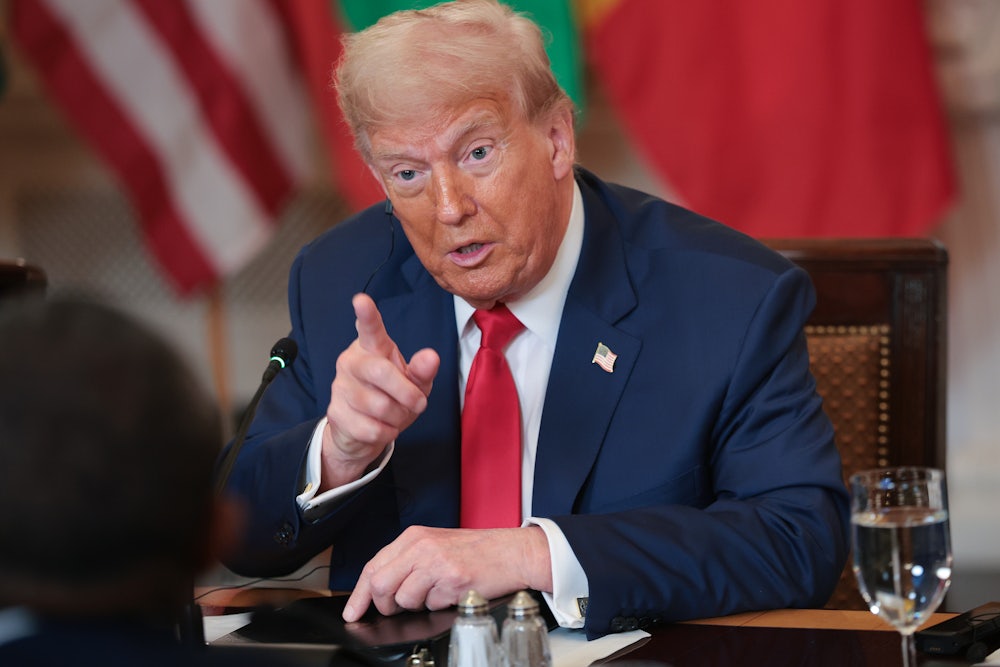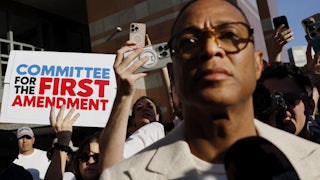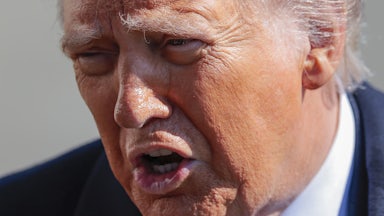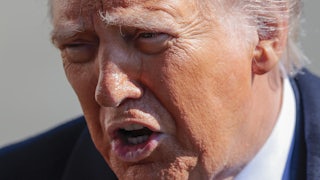This week, President Donald Trump raged on Truth Social that Senator Adam Schiff is guilty of “Mortgage Fraud,” and demanded that he be “brought to justice.” The basis for this claim: Fannie Mae has made a criminal referral to the Justice Department involving several properties owned by the first-term California Democrat.
Many stories on this dutifully reported Trump’s allegations of corruption, and then followed up with Schiff’s response: That the charges are bogus and constitute retribution against a longtime Trump critic who argued the case for his impeachment in the House during his first term.
This framing makes it a story about Schiff’s conduct. But the real story here is Trump’s conduct. It’s how this allegation came to be in the first place. It’s the role that Trump and/or the White House played in getting the federal bureaucracy to arrange events to the point where the president of the United States could pronounce a sitting U.S. senator and political enemy a target for potential prosecution. Understood this way, the story is likely a dry run for much more like this to come.
The unnerving outlines of that story are already visible. The allegations, in a nutshell, are that Schiff falsely designated his Maryland home in the suburbs of Washington D.C. a primary residence even as his real primary home is in California. This allegedly secured Schiff a cheaper mortgage.
Fannie Mae referred this to DOJ, and Trump followed up with this, an apparent message to DOJ that it should prosecute:
Trump: "I think Adam Schiff is one of the lowest of the low. I would love to see him brought to justice." pic.twitter.com/U43QszgrOY
— Aaron Rupar (@atrupar) July 15, 2025
Schiff flatly denies the claim. His spokesperson says Schiff has always been open about owning year-round residences in both Maryland and California. Keeping one residence in a home state or district and renting or owning a second place to stay in or around D.C. is standard for members of Congress.
But where did the allegation initially come from? A Los Angeles Times reporter obtained a memo authored by the Fannie Mae Crimes Unit and sent to the head of the Federal Housing Finance Authority (FHFA), which oversees the government-backed Fannie Mae. The memo lays out the basis for those charges, but as the Times piece on this reports, the memo nowhere says that Schiff committed “fraud,” as Trump claimed.
Even more interestingly, the memo also says this inquiry resulted after the FHFA’s office of inspector general (OIG) made a “Document Demand” from the Fannie Mae Crimes Unit—a demand for documents related to “all” loans “associated with” Schiff.
Experts in how inspectors general function said in interviews that this chain of events seems unusual and troubling. The FHFA inspector general obviously investigates mortgage fraud, they noted, but they asked how—and why—this inspector general might have come to make this specific request involving this specific U.S. Senator’s loans.
“From beginning to end, this process is highly irregular,” Michael Bromwich, a former Justice Department inspector general who’s still well regarded by government insiders, told me.
Making this stranger, these issues involving Schiff have been aired before, during his 2024 Senate campaign, when multiple of Schiff’s Fannie Mae loans and residences came to light. As CNN reported at the time, his spokesperson argued that it was appropriate to describe both residences as primary because they both function that way for the Schiffs (and also to distinguish them from a vacation home).
The Fannie Mae memo itself is squirrelly with its charges. It claims that Schiff “possibly” misrepresented his homes on multiple loans. Read through Trump’s whole tweet on this and it’s clear that someone or other created a tidy package of these charges and handed them to Trump—or whoever wrote this tweet—to translate into this missive. How did that happen?
Experts also point out that the memo shows that the response to the inspector general’s request was forwarded to the head of FHFA—William Pulte, a Trump political appointee and loyalist.
“It is extremely unusual for the response to any IG document request to go to the head of the agency rather than back to the OIG—I have never heard of that,” Bromwich told me. “So far as I know, it is unprecedented for such raw information to be forwarded to the White House. Responses to OIG requests simply don’t go to the White House—ever.”
Did anyone at the White House urge this inspector general to make this document request involving Schiff? Did anyone at the White House quietly hint to Fannie Mae that it should criminally refer this matter to DOJ? Is anyone making an offhand suggestion to DOJ that it open a criminal investigation on this basis?
“The creation of an investigation into a high government official is extraordinarily unusual for a Fannie Mae inspector general,” Don Kettl, former Dean of the University of Maryland School of Public Policy, told me. “What drove this through the bureaucracy? What drove it to DOJ? How did the story find its way into the president’s social media feed?”
Making this worse, this tactic is already emerging as a model. As Talking Points Memo’s David Kurtz points out, Trump alleged mortgage fraud against New York attorney general Letitia James, who sued the Trump Organization for fraud, via similar channels. “Inspectors general are supposed to serve as checks on the president, but it looks like Trump is weaponizing them to attack his political opponents,” Brown University professor Corey Brettschneider, an expert on presidential power, tells me.
Meanwhile, over at The Bulwark, Jonathan Last writes about another sordid tale involving a former FBI special agent who was pushed out because he was friends with someone on Trumpist FBI director Kash Patel’s enemies list. As Last notes, this couldn’t happen without little-known functionaries below Patel being willing to carry out dubious orders.
So on this Schiff matter, are any Trump political appointees at FHFA or Fannie Mae proving, shall we say, very receptive to White House suggestions of investigative targets? Are they eagerly moving these suggestions through the bureaucracy?
These questions are all critical to answer even if you believe the charges against Schiff will end up having something to them (which they probably won’t). What’s more, Democrats need to communicate clearly to the public that instances like these are part of a bigger story: Trump is corrupting the bureaucracy—corrupting the people’s government—by seeding it with loyalists at all levels who are willing to manipulate it to carry out his crazed vendettas.
As Brian Beutler explains, this sort of deep corruption of multiple agencies will inevitably create a need later to “de-Trumpify” them. Democrats should loudly let it be known right now that anyone who is carrying out corrupt orders—or illegal ones—will not be able to hide behind bureaucratic obscurity later. They will be held accountable—politically, or if needed, legally as well.
There are a lot of lingering questions about this whole Schiff mess. And when we start getting real answers to them, one suspects that this story will not look like the one Trump initially set out to tell.






